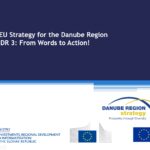On February 17th, 2021, under the Slovak Presidency of the EUSDR and the unanimous decision of the EUSDR participating states towards the approval of Ukraine’s chairing the EUSDR, Ukraine will hold the EUSDR Presidency from November 2021 to November 2022.
The Danube Region, like other EU macro-regions, faces challenges beyond borders – pollution, climate change, unemployment or lack of connectivity – that affect the lives of over 115 million people. To this end, the countries in the Danube basin came together and established the European Union Strategy for the Danube Region (EUSDR), identifying common needs, challenges and opportunities that can be fully exploited only in cooperation to boost regional cohesion.
“The Danube Strategy has the privilege to involve partners both from the EU and non-EU countries. We, the Slovaks, are well aware about the importance of being involved into activities carried out on the EU level even before formal accession to the Union. Therefore, we strongly support the efforts of our friends from countries outside the EU borders to be partners in the implementation of the Strategy at the same level. Cooperation with non-EU countries must be part of our work and for this purpose the EUSDR Slovak Presidency assumed to concentrate more on the involvement of the non-EU countries into the activities of Danube Strategy as it is prerequisite for a stable Europe with high living standards. To this end, I would like to assure Ukrainian partners that they can count on our assistance during their presidency in 2022,” Slovak Vice Prime Minister, Minister of Investment, Regional Development and Informatization, Veronica Remišová stated.
Ukraine will be the first non-EU member state to chair the Danube macro-regional strategy. As EUSDR chair, Ukraine commits to share the initiatives of the countries that chaired the EUSDR before and take all necessary measures to achieve tangible results especially the implementation of the 2020 revised Action Plan.
“Presiding over the Danube Strategy is a great responsibility for Ukraine and an opportunity to learn from the experience of other countries in the region. Each joint platform with the EU speeds up Ukraine’s European integration path, especially when it comes to co-operation within one of the largest regions in Central Europe”, said Oleksiy Chernyshov, Minister for Communities and Territories Development of Ukraine.
The EUSDR unites nine EU Member States (Austria, Bulgaria, Croatia, the Czech Republic, Germany, Hungary, Romania, the Slovak Republic and Slovenia) and five non-EU countries (Bosnia and Herzegovina, the Republic of Moldova, Montenegro, Serbia and Ukraine).
Pursuing a rotation principle, the EUSDR Presidency is taken over by an EUSDR participating state for a one-year period. The role of the incumbent Presidency is to proactively perform the coordination among national interests (National Coordinators) and thematic priorities (Priority Area Coordinators) and is supported by Danube Strategy Point. In close cooperation with the European Commission (DG REGIO) the EUSDR strives to facilitate ownership and commitment among the participating states, supports joint decision-making and close cooperation.
Ukraine’s application comes as a natural result, after the country adopted three important measures at national level in order to intensify its participation in the Danube Strategy through the reinforcement of internal governance of the EUSDR and by forming the institutional platform for its effective implementation.
Photo: By Lipatova Maryna via Shutterstock





